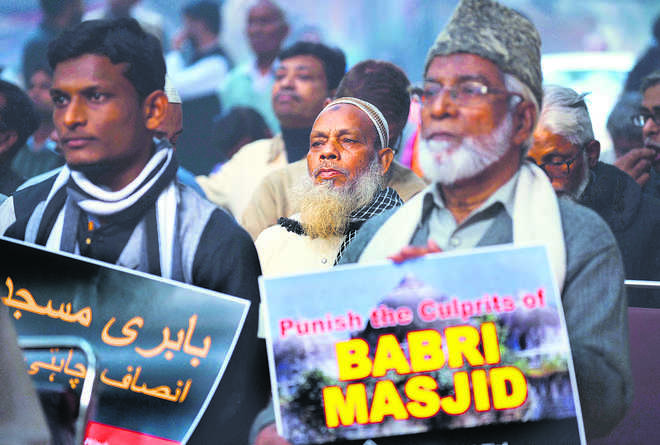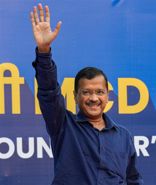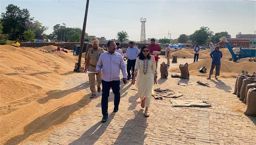
Playing with fire: Communal harmony must not be frittered away for small gains.
Hasan Suroor
OVER the past 25 years there have been so many twists in the Ayodhya/Babri Masjid dispute that they could well fill a whole quiz show. Yet, in fact, nothing has changed on the ground, as is evident from RSS leader Mohan Bhagwat’s typically shrill threat to build a Ram Mandir exactly at the “same spot” where Babri Masjid stood. And lest anyone missed it, he repeated it in slow motion: “This is not a populist announcement. This is a firm fact and is not going to change.” What Bhagwat, in effect, was saying was that the ongoing judicial process is meaningless. Because irrespective of the judicial verdict “Ram Mandir alone will be built (on the disputed site), nothing else will be built”. His remarks were clearly intended to put pressure on the Supreme Court which is due to start final hearings in the Ram janambhoomi case next week, coinciding with the 25th anniversary of the demolition of the Babri Masjid.
Similarly, hardline Muslims insisting on rebuilding the mosque at the site are unlikely to accept any verdict not favourable to them, according to those familiar with the Muslim mood. “Right now they are saying they will abide by any Supreme Court verdict but that’s because there’s an expectation that they will win the case,” said Prof Tahir Mahmood, former chair, National Minorities Commission. So, for all the toing and froing over the past quarter century, the rival positions remain as polarised as they were on December 6, 1992, when an RSS-BJP inspired maurading mob pulled down the mosque. Bhagwat’s remarks reflect the same disregard and contempt for judicial processes that the Sangh Parivar demonstrated when it destroyed the mosque after giving a solemn undertaking to the highest court in the land that no harm would come to it.
Meanwhile, the SC’s suggestion for a settlement through mutual negotiations has come as a godsend to the RSS — allowing it and its fraternal groups to divide the Muslim community by pitting Shias and Sunnis against each other. It’s trying to co-opt a section of Shias to do its bidding by promising them patronage and legitimacy in return. And the strategy is working: a full-blown row has erupted between UP’s Shias and Sunnis, with the two sides now engaged in a slanging match among themselves as though the mandir-masjid dispute is between them rather than a clash over majoritarian bullying.
This follows UP Shia Waqf Board chairman Syed Waseem Rizvi’s dramatic announcement at a press conference flanked by Mahant Narendra Giri, chairman of the All India Akhara Parishad — an organisation of Hindu saints and sadhus — that the board has submitted a draft proposal to the Supreme Court offering to give up the Muslim claim on the disputed site and requesting that a one-acre land be granted in Lucknow’s Hussainabad area for Muslims to build a masjid-e-aman (mosque of peace). It says it has reached a “long-term settlement” with the “concerned Hindu brothers and stakeholders”, and cites instances in Muslim countries where mosques built by “unjust people” were “removed” to other sites.
What the board is disingenuously touting as its own creative solution has the Parivar’s fingerprints all over it, regurgitating its well-known line that “Ram janambhoomi” is the exclusive preserve of Hindus and Muslims have no business there: “mandir wahin banega”, it insists, but as a gesture Muslims may be given land elsewhere to build a “grand” mosque. I’m struggling to spot the difference between this and the board’s proposal, which further claims that Shias are the sole legitimate “stakeholders”, dismissing Sunnis as “interlopers” and “fanatics” who do not want an amicable settlement with Hindus. This has infuriated Sunni groups. Generally, I don’t have a lot of time for groups like the All India Muslim Personal Law Board (AIMPLB) and the Babri Masjid Action Committee — both regressive organisations which have done more harm than good to Muslim interests. But, in this instance, they are right to question the Waqf board’s claims.
It must explain the basis of its claim that it’s acting on behalf of the entire Muslim community, and that its proposal enjoys the support of “all stakeholders”. “On whose behalf has he brought this draft proposal? He (Rizvi) does not enjoy the confidence or recognition of either the Sunni or the Shia sect,” retorted AIMPLB’s counsel in the case and its senior member Zafaryab Jilani. And it’s a question that Sunnis and Shias alike are asking. Leading Shia organisations and scholars have been quick to dissociate themselves from Rizvi’s move. Indeed, the All India Shia Personal Board has publicly slammed it, with its spokesman Maulana Yasoob Abbas making clear that it is “certainly not ready to give up the mosque land…and does not agree to what Rizvi or the Shia Waqf Board has claimed”. It’s important to remember that despite their differences, Shias and Sunnis have consistently taken a common stand on the Ayodhya issue which is diametrically opposite of the Rizvi-BJP compact.
Readers might be curious who’s Rizvi and what is he doing in BJP’s company. A look at his revolving-door politics explains everything: he began his career with the Samajwadi Party (SP), defected to the BSP, returned to the SP and was expelled over allegations of corruption. That’s when he landed up in the BJP. Conspiracy theories abound about his “real” motives, but we shall let that pass. The real question is: why was the BJP so keen to embrace him despite being aware of his reputation considering that some of the cases of alleged forgery were, in fact, reportedly registered under BJP rule. The answer is simple: for years, the BJP has been wooing UP’s, and especially Lucknow’s Shias because of their dominant social position as heirs to the erstwhile ruling elite. Mukhtar Abbas Naqvi, the only Cabinet minister in the Modi government, is a Shia; so is the only minister in the Yogi Adityanath’s government. And it was the BJP’s Kalyan Singh government which lifted a historic ban on taking out large Muharram processions in Lucknow to woo Shias.
Thus, over the years, the BJP has built a small Shia constituency in UP but it is playing a dangerous game by preying on the Shia-Sunni divide. The tactic might help it in the short-term, but a fragmented and weakened community of 180 million people will only further fuel sectarianism at a time when the country is already being torn apart by sectional polarisation. In the pursuit of its short-term gains, has the BJP ever pondered the long-term national security implications of what it is up to?
The writer is a London-based commentator



























